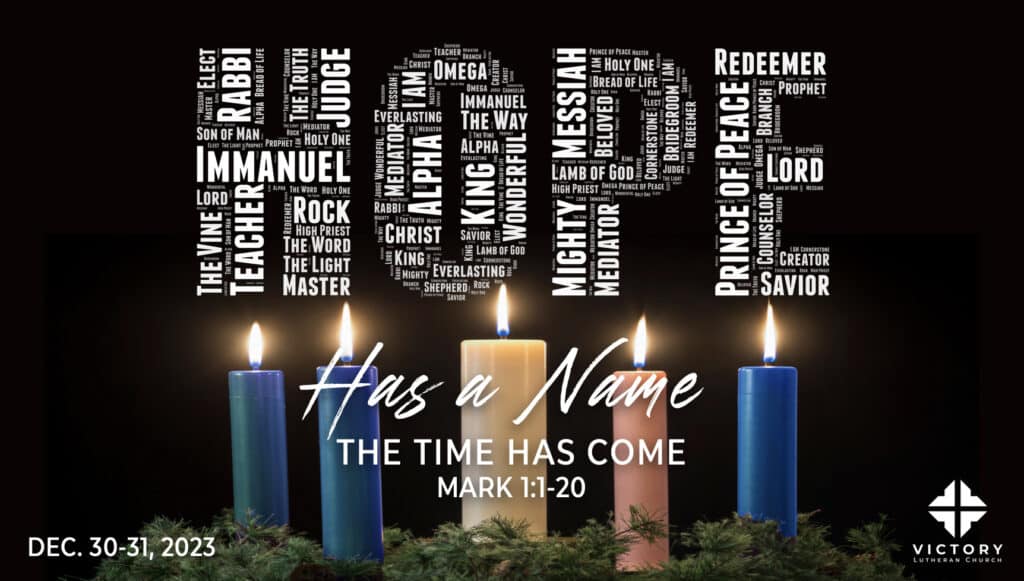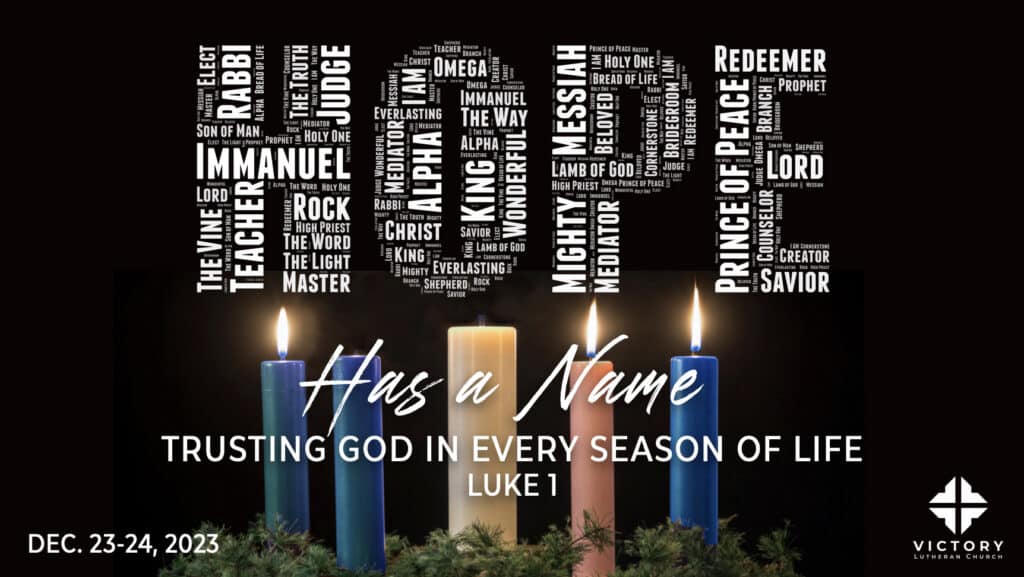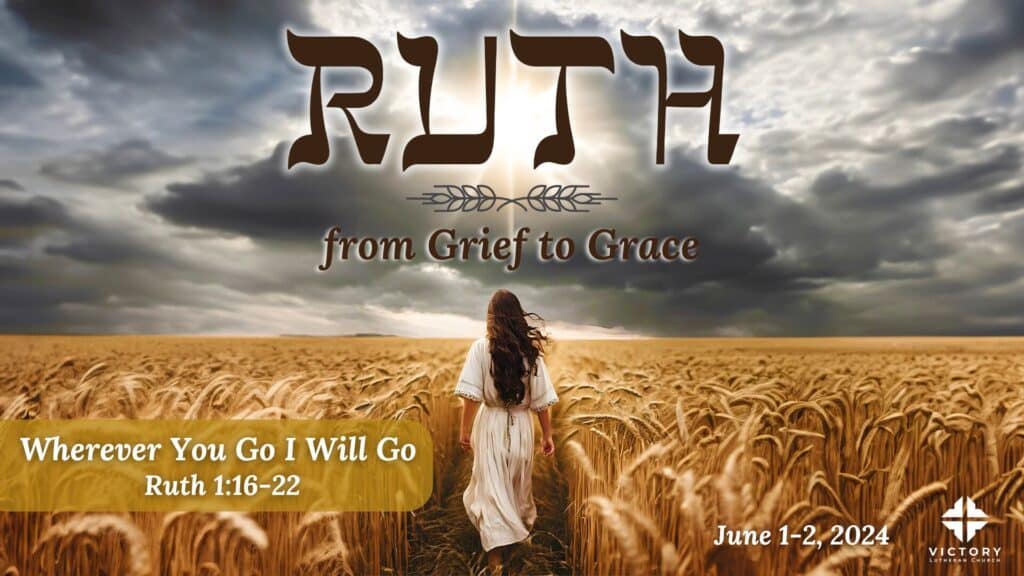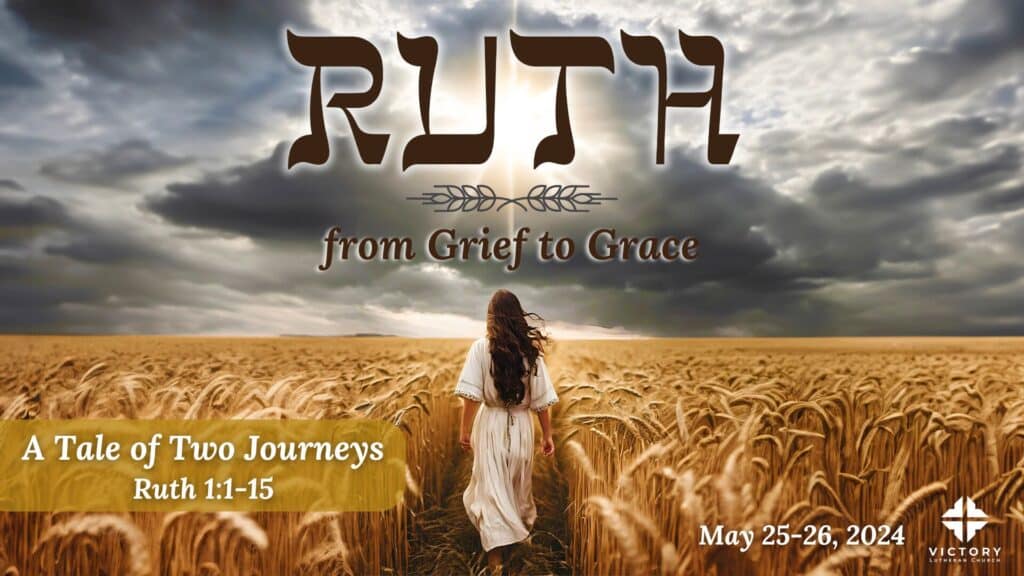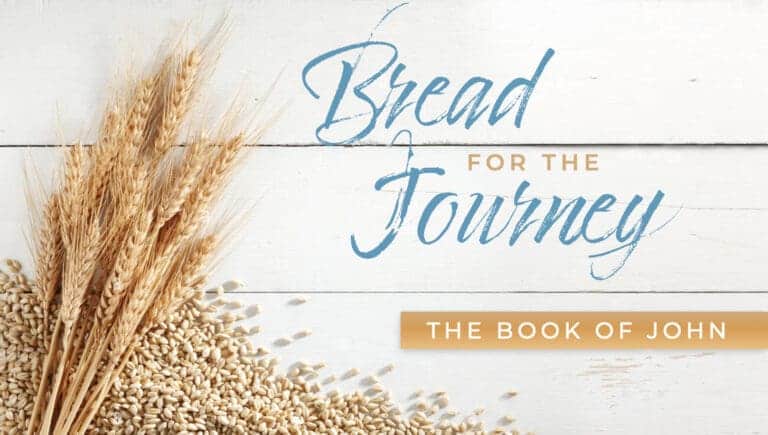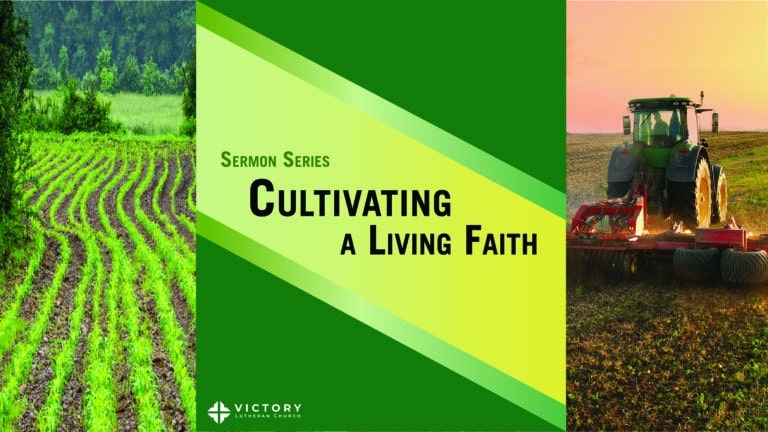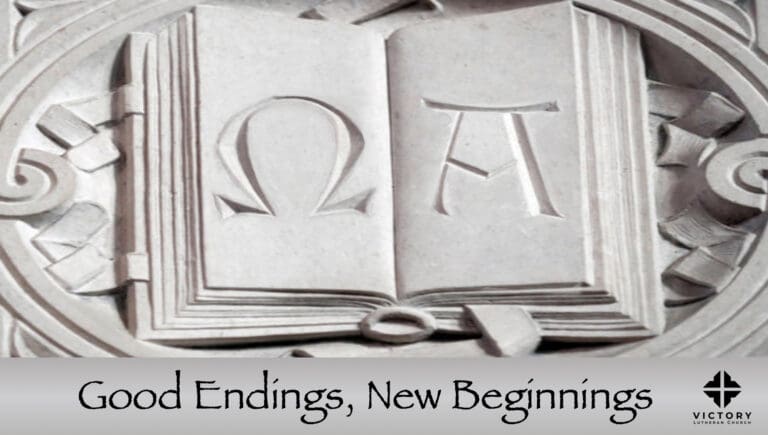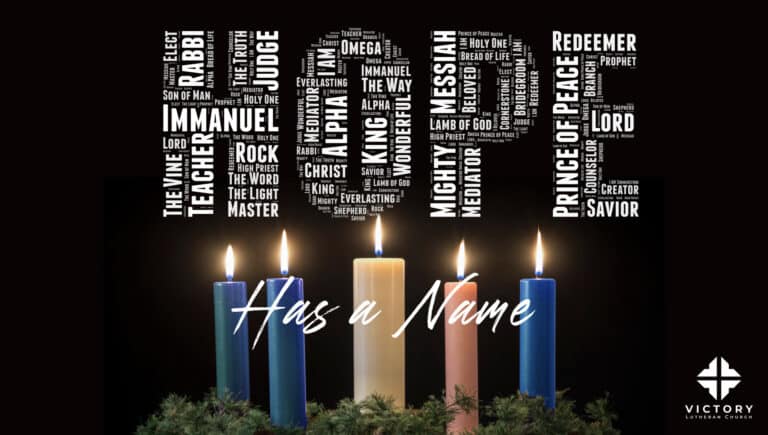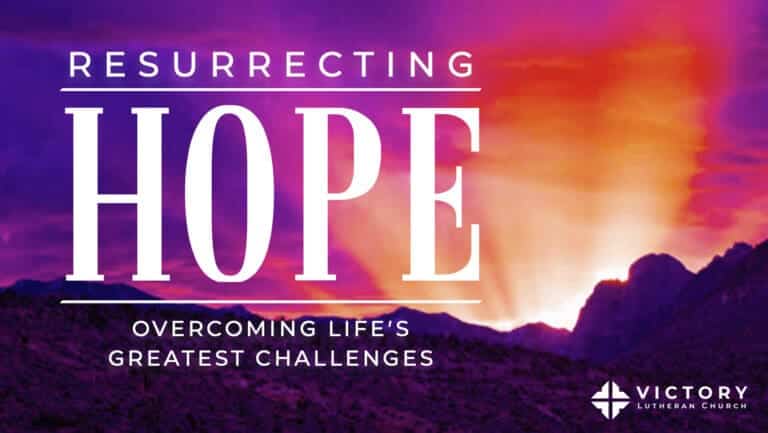Hope has a name. That’s the sermon series we are in during this season leading up to Christmas, the season called Advent. And today we’re going to be looking at comfort. Comfort in the chaos. For me, one of the most soothing verses in all of scripture is this first verse in Isaiah chapter 40. Comfort, comfort my people, says your God. God’s people back then needed to be comforted and don’t we often feel the same today also? You know, the very need for comfort acknowledges. A sense of discomfort, an unsettling feeling that we are not at ease within ourselves or thing outside of, things outside of ourselves. That we are, sometimes even, uncomfort able, we’re uncomfortable. And yet to receive this comfort, one really must first acknowledge the need for it. And I find I have an annual, seasonal. affective disorder around the need for comfort as a Vikings fan.
I had this confession at 8 o’clock. Someone gave me a little purple gnome Santa Christmas ornament. This just feeds my disorder, friends. Come on. But, I mean, it’s, it’s, and yet I still have trouble admitting that I need comfort. But in times when we need real comfort over real issues. I think our natural tendency is often to run to one of two common responses, that of flight or fight. Personally, for me, hailing from the Midwest, my flight response, it’s at hand. And it comes in the form of what can be known as Minnesota Nice. You’ve heard of this? Here’s a definition of Minnesota Nice, and this comes from a dark comedy miniseries of Fargo, of all places. And here’s how they describe Minnesota Nice. An aggressively pleasant demeanor, often forced, in which a person is chipper. And selfie facing, no matter how bad things get. Isn’t that true? It’s, uh, but it’s really a way of deflecting, or ignoring, or denying that anything’s amiss, right? Hey, how you doing? Oh, just fine, don’t you know? Could be worse. Better than a kick in the pants. Minnesota nice. Or, the other, I think, common response to trouble is to fight. So like, from the movie Fight Club, fighting is an attempt to assert control over a certain situation or person through active or passive aggression. And while not necessarily physical, it resembles the unspoken rules of Fight Club, which is one and two first rules. You don’t fight, you don’t talk about Fight Club. And yet you fight. In other words, for us, When we fight, our actions may be covert, but the struggle is real. Flight or fight? Minnesota Nice or Fight Club? Isn’t there a better way? There is. And today I want to posit this to you, biblically, in that a better way to respond to trouble and Discomfort is to release and receive.
Release, it’s the experience of letting go of that instinct to flee or to fight. And instead to humbly admit that there is indeed a problem that causes stress and anxiety. And that we are more than merely uncomfortable. We actually desperately need comfort. Release to let go. And then receive. To look to God for His eternal source of comfort, found in His promises, in His Word. And don’t we need God’s faithful comfort? Because this world and life is hard, isn’t it? And I’ve seen firsthand, in real time, this desperate need for comfort. In the unbroken sobs of a wife who just found out that her husband is leaving her and the children. In the paralyzing news from a doctor of a grave health diagnosis for a loved one. Or the phone call that you’ll never forget when you learn of a loved one who has just died. I mean, countless reasons bring us to a point of desperately needing comfort. And I’ll bet you have your own. Maybe even right now. So instead of denying or attempting to solve the problem independently, I invite you to turn to God. Share with him the depths of your desperation. Be honest about your need for comfort, and invite him to meet you right where you are at with his words of peace.
Psalm 34 reassures us, The Lord is close to the brokenhearted and saves those who are crushed in spirit. And my friend, if that describes you today, then this message is for you. I invite you all to turn in to your Bibles or devices to Isaiah chapter 40. I’m going to read the first 11 verses. Comfort, comfort my people says your God. Speak tenderly to Jerusalem and proclaim to her that her hard service has been completed, that her sin has been paid for, that she has received from the Lord’s hand double for all her sins. A voice of one calling, In the wilderness prepare the way for the Lord. Make straight in the desert a highway for our God. Every valley shall be raised up, every mountain and hill made low. The rough ground shall become level, the rugged places a plain. And the glory of the Lord will be revealed, and all people will see it together. For the mouth of the Lord has spoken. A voice says, cry out. And I said, what shall I cry? All people are like grass, and all their faithfulness is like the flowers of the field.
The grass withers and the flowers fall because the breath of the Lord blows on them. Surely the people are grass. The grass withers and the flowers fall, but the word of our God endures forever. You who bring good news to Zion, go up on a high mountain. You who bring good news to Jerusalem, lift up your voice with a shout. Lift it up, do not be afraid. Say to the towns of Judah. Here is your God. See, the Sovereign Lord comes with power, and He rules with the mighty arm. See, His reward is with Him, and His recompense accompanies Him. He tends His flock like a shepherd. He gathers the lambs in His arms, and carries them close to His heart. He gently leads those. The Word of the Lord. Let’s pray.
Living God, breathe now on us your life giving spirit that we might receive your faithful promises in your word. As you’ve prepared comfort for all people through Jesus, prepare our hearts to hear of that comfort and peace and then to receive and be swayed by your mercy and love. In Jesus name I pray. Amen. Dear friends, grace to you and peace. From God, our Father, and our Lord and Savior, Jesus Christ. Amen. Here’s my starting point. It’s actually pretty obvious. We all long for comfort. Let me set the text context here in our Biblical text. The historical backdrop of Isaiah’s prophecy. The nation of Judah. It has gone through hard times, but they’ve got a lot more coming. When this prophecy is written and delivered, when it’s delivered, there’s still a hundred years yet of the rule of wicked kings in Judah, in the southern kingdom. And then comes the attack of Babylon, defeat, death, and plunder. And then taken away, far away from the promised land, for 70 years of exile.
And then, what? Rebuilding and, oof, the need for comfort is just prevalent. The people long for words of comfort. And so Isaiah is called to speak tenderly and offer comfort to Jerusalem. That Hebrew word for speak tenderly, it really means speak to the heart. And that’s my prayer today, that for all of you, God would speak to your heart. It is in this context of turmoil that God calls Isaiah to speak tenderly and words of comfort to Jerusalem. Comfort, a concept unfamiliar or unaccessible to a people in distress, and yet is to be introduced into their lives, into the narrative of their, their own existence. And from this we learn an important point. That the seeds of comfort often take root in the soil of adversity. I don’t know if you’ve ever really thought of this. That adversity is the soil for the adversity. I don’t know if you’ve ever really thought of this. That adversity is the soil for the seeds of comfort to be planted. In other words, when our lives are falling apart, we are encouraged to ask God for comfort. And yet, we are not promised exemption from all adversity.
And yet, even in the midst of adversity, we can find God’s comfort. Comfort in the chaos. This is part of God’s plan for us to release our lease, our release, to release our need to fight or flee. And that’s this, to let adversity prepare you, for you, the way of the Lord, prepare you the way of the Lord. Adversity can actually be part of God’s preparation. It’s a metaphor for a straight and smooth road. It requires removing obstacles. for God’s arrival. You ever been in Monument Valley? My wife and I got to drive this road in Monument Valley once, unknown, knowing that it was coming. And when we drove that same direction with Monument Valley right there on that road, it was just stunning, mesmerizing.
I still remember decades later. It’s impressive. Isaiah employs this metaphor of a straight and smooth road in the desert. To describe the preparation required for the arrival of the Lord. And I, I believe in our text, the desert. Even though we live in one, the desert in this text, it symbolizes trials and sufferings. The desert, often a harsh and unforgiving terrain, becomes a symbol of the trials of life. And Isaiah encourages the people to prepare to see God work, even in the midst. of our metaphorical desert experiences, or that when we are distressed. Another part of release from our text is to put things in perspective. One of the key ways to prepare the way for the Lord is to remember the fading grass and God’s eternal word. I find it curious and compelling that one of the words of comfort that Isaiah gives is this poignant comparison between the fleeting nature of human life, likened to grass or flowers that fall and fade away, contrasted with the enduring eternal Word of God.
So here’s the takeaway. It’s a way to receive comfort, to receive God’s Word as the constant solution to your problems and needs. In a world where public opinion changes and is unreliable, God’s Word stands as a constant, offering lasting solutions to our problems and needs. And let me be a bit more specific here spiritually. There’s a great quote from Martin Luther about comfort. He writes, Comfort is for those wounded or afflicted. And I’m not talking about a police officer. I’m talking about God’s word of law. The moral law in the scriptures. Martin Luther’s wisdom reminds us that comfort is for those who’ve been wounded or terrified by God’s law. Comfort is for those who recognize their emptiness, can admit it, and their need for comfort. So then once we release our desire to control, What is it then that we are to receive, release and receive? Well, first Isaiah points us toward the shepherd’s care, to receive the shepherd’s care. In this prophecy, God is portrayed as a powerful and yet gentle shepherd.
Despite his might, God cares for his flock with a gentleness that really defies worldly experiences and expectations. And in recognizing God as our shepherd, we acknowledge our need to be led, our need for comfort and care, especially in times of grief, or sadness, or loss. I love that, those words from Isaiah, where it talks about our, our shepherd holding us close to his heart. Maybe that’s where some of you need to be today. Instead of denying or ignoring our brokenness, Isaiah encourages us to admit our need for comfort and to look to God. And today, on this side of the cross, we have the advantage to know that the comfort from God’s written word is ultimately found in God’s living word.
We read it in the Bible, we see it, and receive it through the living word, which is Jesus Christ. We know that this comfort comes from Christ and Christ alone. Which brings us to the culmination, I think, of Isaiah’s prophecy. In our text today that points to the sovereign Lord who comes with power, promise, comfort, and restoration. So have your heart prepared to receive the ultimate comfort in Jesus Christ. In our text, Isaiah clearly ties forgiveness for sin with God’s comfort. In verse 2, speak tenderly to Jerusalem and proclaim to her that her hard service has Been completed that her sin has been paid for, that she has received from the Lord’s hand double. For all her sins. Isaiah was declaring forgiveness of his, of Judah’s sin. Her hard service over her sin paid for double. But how? By who? Well, using this shepherd sheep theme, Isaiah elsewhere prophesied about Jesus. In Isaiah chapter 53. We all, like sheep, have gone astray. Each of us has turned to his own way.
And the Lord has laid on him. The iniquity of us all. Isaiah clearly prophesied about the coming Messiah 700 years or so before Jesus arrived. And we know that today, the ultimate source of comfort is found in God’s Son, the Christ child we celebrate at Christmas. The one on whose manger the shadow of the cross fell. The hands, the tiny infant hands, born to be pierced. That God laid on Jesus the iniquity. Jesus paid it all, all to him I owe. So dear friends, as we navigate the desert seasons of life, may we embrace the comfort that comes from confessing our brokenness, to release our need to control and admit our inability to fix or solve, and then to place our trust in God. In the Good Shepherd, the Sovereign Lord, to receive the eternal comfort from the living Word of God, Jesus Christ, the promise of His presence, payment for your sin, and peace for your soul. For in Christ Jesus, we do indeed discover the ultimate source of comfort and joy. Join me in prayer. Dear Heavenly Father, thank you for the comfort found in your Word, written and living. Help us to release control, to flee or to fight, and may we gladly receive the Shepherd’s care, trusting in Jesus Christ for our ultimate comfort. And may we navigate life’s deserts with the assurance of Christ’s presence with us, payment for our sins, and enduring peace. Comfort ye your people. Comfort us, Lord Jesus, I ask in your precious name. Amen.

